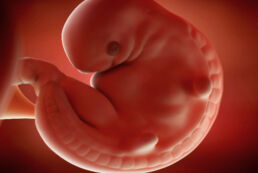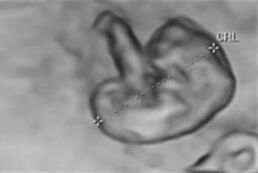Baby's Height and Weight
The 7-week-old baby in the womb is about 10-13 mm in length, about the size of a blueberry or a small grape seed. Its weight is about 2 grams.
Development of the Baby

You’ve been excited since you heard about the pregnancy and must be wondering how your baby is doing. The 6-week-old baby continues to develop and grow rapidly in the womb. The baby’s brain and organs, including the cerebral hemispheres, begin to form. In a 6-week-old baby, the heart beats at a regular rhythm 150 times a minute. That’s almost twice as many as an adult.
At the 6th week of pregnancy, the baby’s eyes, eyelids, lens and cornea parts in the eye begin to form. The spine structure is fully developed. Secondary branches have begun to form inside his lungs.
In the 6th week of pregnancy, the mother’s blood is transferred to the baby through the umbilical cord through the placenta. The placenta, which produces hormones that support the development of the baby, sends him nutrients and oxygen. The placenta also helps to remove waste materials from the baby’s body. Thanks to the filter during the blood passage between the mother and the baby, the blood group of the baby and the mother may be different.
Ultrasound Image

Since the embryo has more prominent features in the 6th week of pregnancy, it can be seen with clearer lines. In the 6-week gestational sac image, the baby’s head, nasal protrusion, trunk, arms and legs can be seen as the beginning of the coccyx. The baby’s head and the rest of the body are the same size. At the end of the 6th week of pregnancy, the baby’s heartbeat begins to be heard on ultrasound examination. His heart can be seen as a small spot in the middle of his body just above his belly.
In the 6-week-old baby ultrasound image, the classic C-shaped fetal posture can be seen prominently, with the baby’s knees facing the chest and head facing the abdomen. The baby will stand like this in the mother’s womb throughout the pregnancy. The doctor also measures the baby’s height from head to toe during the 6th week of pregnancy. This measurement is called CRL. CRL measurement is performed at each ultrasound examination, both in terms of the evaluation of the gestational week and because it gives the estimated time of birth of the baby.
Changes in the Mother's Body
Human Choironic Gonadotropin (HCG) hormones, progesterone (progesterone) hormone and estrogen hormone levels, which help the embryo to settle and develop in the expectant mother since the formation of the baby, have started to increase. The uterus, which is the size of a large plum before pregnancy, expands 500-1000 times its normal length during pregnancy. At the end of six weeks of pregnancy, the uterus will grow to 2-3 times its original size, reaching approximately the size of an apple.
From the first weeks of pregnancy, there is a very rapid increase in the mother’s metabolism, up to almost 20-25 times, in order to meet the needs of her baby. There is also a 40 percent increase in the amount of blood pumped from the heart to the organs and skin. The blood volume in the body will also increase by close to 50percent.
Changes in the mother at 6 weeks of pregnancy are visible changes. Tenderness, growth and darkening of the nipple in the breasts are among the signs of 6 weeks of pregnancy. Fat starts in the lumbar region.
Points need to be considered
If you are a expectant mother who has previously experienced ectopic pregnancy, miscarriage or pregnancy problems such as preeclampsia (pregnancy blood pressure), it is useful to first discuss all these issues with your doctor at 6 weeks of pregnancy. Such situations in the past do not mean that they will also be experienced in this pregnancy. For this reason, you should first be relaxed and calm. Prospective mothers aged 35 and above may also be stressed due to the risks that their age may bring. However, these risks are not seen in every expectant mother who has an advanced pregnancy. Moreover, considering that there is a significant increase in the number of women who become pregnant after the age of 35 today and most of them have a healthy pregnancy, there is no need to stress too much. Doctors will already share the risks arising from advanced age with the expectant mother when the time comes and recommend some tests. Expectant mothers who regularly perform routine examinations and tests will have a healthy pregnancy period.
From the sixth week of pregnancy, the expectant mother may have frequent urge to urinate. This can cause urinary tract infections. Since this infection will need to be treated immediately, the expectant mother must definitely inform her doctor. If you have a metabolic disease such as diabetes or thyroid that requires routine medication, you should definitely tell your doctor at the first examination. If necessary, your doctor will guide your treatment throughout the pregnancy with the specialist doctor who is related to this problem.
Hormonal changes during 6 weeks of pregnancy can also cause ups and downs in your emotional state. On the one hand, the thought of starting a new life and on the other hand, the thought of being under a great responsibility can cause you to enter a melancholic mood. You may also have concerns about whether I will be a good mother or take good care of my child. If it is a desired pregnancy, it will be easy for you to get out of this situation with the support of the environment. If it is an unwanted pregnancy and there is an increase, not a decrease, in this emotional state, it is useful to get expert support.
Although nausea and disgust with some smells are seen prominently among the symptoms of 6 weeks of pregnancy, they may not be seen at all in some expectant mothers. Those with extreme nausea may feel better if they have foods such as low-salt crackers on the edge of their bed and get out of bed after snacking on these foods as soon as they wake up in the morning. Eating unsalted chickpeas during the day can also suppress nausea. It would be useful for expectant mothers who cannot relieve their nausea and vomiting to inform their doctors no matter what they do.
If the doctor does not recommend it from the first weeks, the expectant mother should not use any medication. Harmful habits such as smoking, if any, should be completely abandoned.
Canbebe on Social Media!
Join our community of mothers and fathers on social media. Be close to caring community, sharing advices between each other on our everyday life with our baby.

